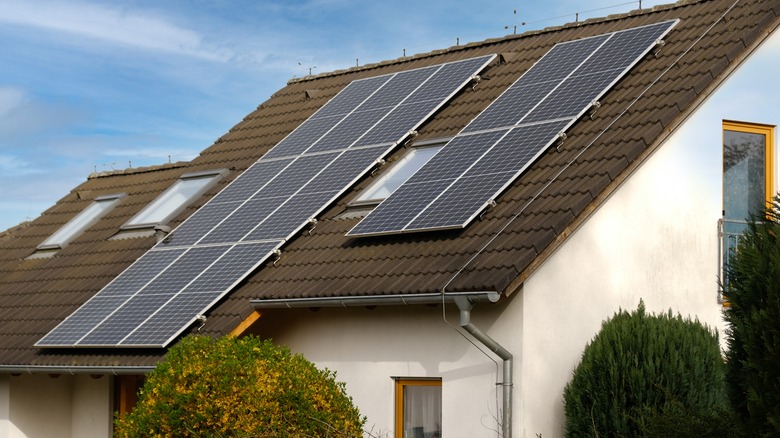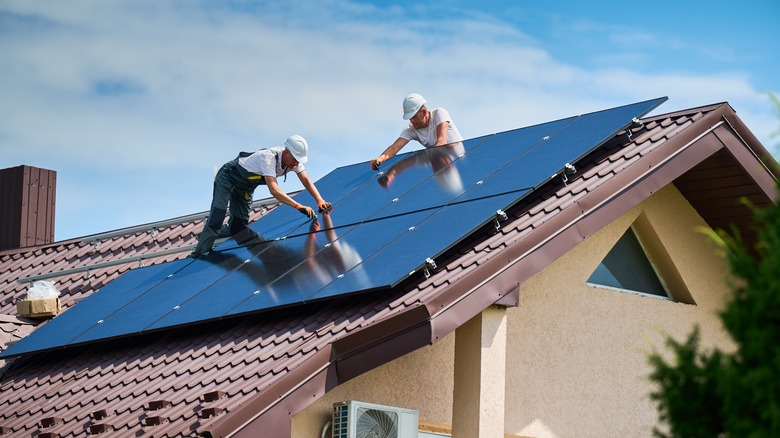How Electric Companies Are Trying To Squeeze More Cash Out Of Solar Users
Home solar panels aren't just an environmentally friendly choice. They're designed to cut costs, at least after you've paid off the initial investment. Not only will you see a reduction in your electric bill, solar panels may help insulate you against rising costs in the future — at least, that's what proponents of solar energy have said for years. However, you'll want to be aware of any hidden costs, including additional fees from your electric company, before installing solar panels. Recently, many states have added new fees for solar users, while some utility companies have attempted to lower compensation rates.
For example, an electric company in Puerto Rico is charging a $300 fee for all solar users. In Arizona, solar customers see a fee of $2 to $3 per month added to their bill. Meanwhile, many Nevadans will also see changes to their utility bill, including a new fixed-price monthly fee. Some of these added costs are marginal, and many are intended to be reinvested to make these systems more efficient for consumers. Nonetheless, solar users should be aware of these changes.
Changes to policies in Puerto Rico, Arizona, Idaho, and beyond
In fall 2025, Puerto Rico's LUMA Energy announced that it will charge customers that have already installed solar panels an additional $300 fee if those homes are connected to its grid. The company said that the fee, which will net them over $50 million, will pay for what it called a technical interconnection study to ensure that its system remains stable.
Meanwhile, Arizona Public Service tacked on a $2 to $3 fee every month for all solar customers. While this only amounts to about $36 per year, it's an additional fee that non-solar customers are not paying. That being said, the fee is intended to pay for costs that are associated solely with solar customers, and this small fee is unlikely to dissuade many from making the switch to solar. On the other hand, in Nevada, solar customers will pay a new fee beginning in April 2026. All NV Energy customers will actually pay the $18.50 charge, which is a daily demand cost. Typically, when solar customers have excess energy, it can earn them credits that offset costs. However, this fee is fixed and cannot be offset through net metering, which some argue disincentivizes solar usage.
In Idaho, one electric company called Idaho Power initially proposed lowering compensation rates for solar users by 60%. However, this move was decried during a public comment period and the company eventually settled by cutting metering rates by 31%. Nevertheless, these examples show that electric companies are trying to squeeze more cash out of solar users in various regions.
The perks can still outweigh the drawbacks
It's not bad news on all fronts, however. In California, a bill called AB 942 was proposed that threatened to cancel solar contracts for residents who'd invested in solar years ago and replace those contracts with less favorable terms. In response to public outcry, however, California legislators made drastic changes to the bill, and existing solar contracts were ultimately protected. Similarly, in Virginia, state regulators struck down Appalachian Power's bid to compensate solar panel users less for excess energy.
All of this is occurring at the same time that federal tax credits for solar panel installation, under which you can claim 30% of the cost of your solar system as a credit on your tax bill, are scheduled to end by 2026. That being said, many states offer their own solar panel incentives that may help offset some of these fees. In New Jersey for example, homeowners receive $85 for every 1,000 kWh of solar energy their solar panels generate, and Massachusetts also has a program that provides production-based payments.
Ultimately, solar panels remain a viable way to lower your home energy bill while also positively contributing to the environment. Energy costs continue to rise, and in many cases, solar panels will still be worth it. The lesson here is: Do your research before investing. Beyond looking at the process and cost of installation, contact your electric company so that you understand the terms and conditions that will govern your solar contract.


